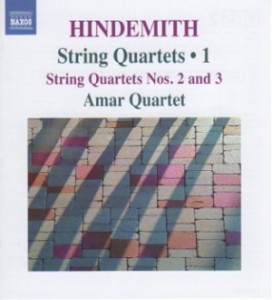The Swiss Amar Quartet is named for Hindemith’s own group, formed for the premiere of the Third Quartet in C major (1920), included on this first disc in what promises to be a complete quartet cycle. As we all know, Hindemith was a very serious composer, and these are big, serious quartets, but they are by no means impenetrable. Busy, yes, “notey” for sure, but also full of good music and certainly worth the serious consideration of chamber music aficionados. The booklet notes speak of quartet writing in the tradition of Brahms and Reger, and that’s a good place to start, but Hindemith was himself a string player, and perhaps this helps to prevent his textures from sounding quite as heavy as with those other two composers, even though he’s often just as dense.
The Second Quartet (1918) is a wartime work, though you’d never know it. Its three movements grow progressively longer; indeed, the first movement is as tightly constructed as something by Haydn, whereas the finale is a virtuoso extravaganza that lasts more than 15 minutes. Still, the thematic invention is memorable, melodic, and not anything like the relentlessly acerbic Hindemith of the 1920s, or the mature composer of the mid 1930s and later. The Third Quartet finds him moving toward that 1920s style, with increasing chromaticism within a basically tonal framework, and a much more balanced three-movement form. Once again, this is virtuoso music for the players, but the heart of the work is the deeply expressive central slow movement, which is very beautifully sustained in this performance.
Indeed, I strongly doubt that Hindemith’s own quartet played these pieces nearly this well. He was by all accounts a rather dry performer, whereas this particular Amar Quartet invests the music with considerable warmth and manages to maintain a remarkably attractive ensemble tone even in the two finales where everyone is going crazy. I offer a segment of the Third Quartet’s finale as an example of just how pleasing this group sounds at all dynamic and pitch levels. If they keep up this standard, there is little doubt that this will become the reference edition in this music, and perhaps will win for it the friends that it surely deserves. The engineering is ideal, and does the performances proud.
































